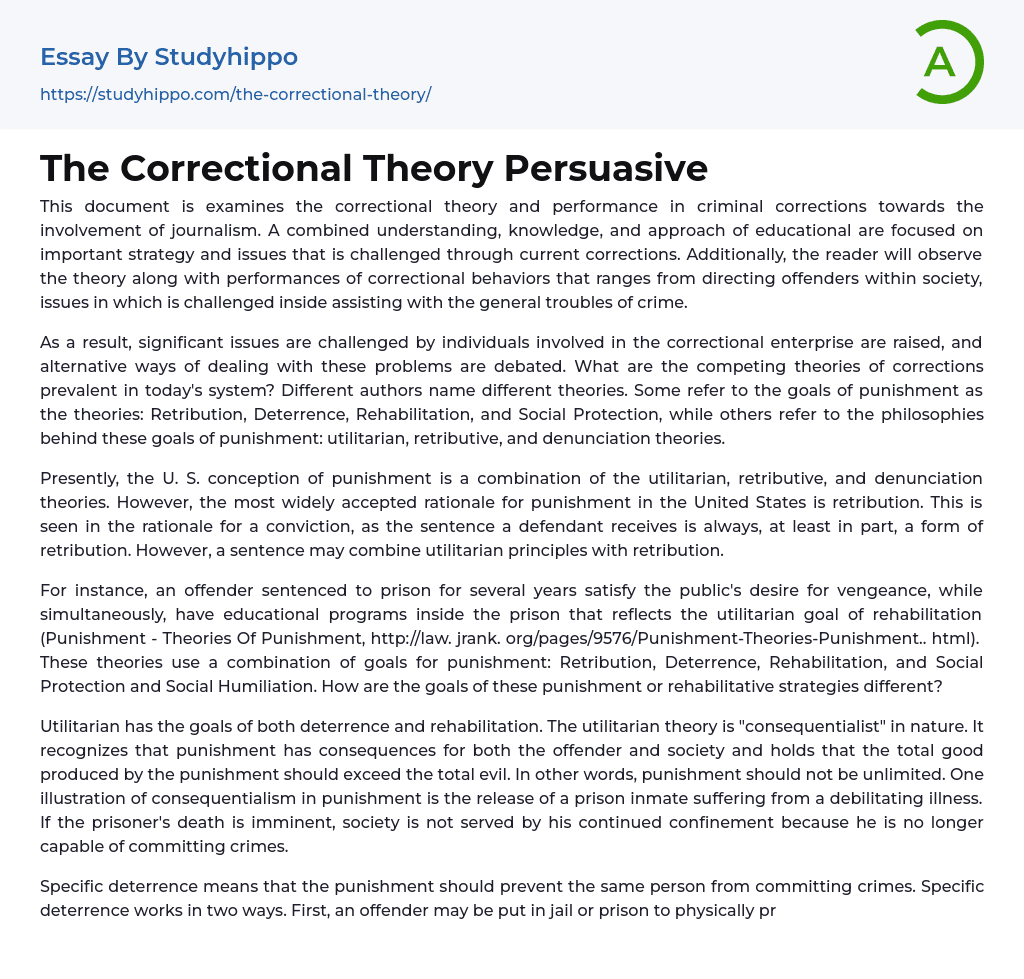In this document, the connection between correctional theory, performance in criminal corrections, and journalism is examined. The significance of education in tackling key strategies and challenges in present-day corrections is emphasized. Readers will also delve into correctional practices' theory and behaviors, including guiding offenders in society and addressing the broader problem of crime.
The correctional enterprise raises significant issues that individuals involved in it challenge, and alternative ways of addressing these problems are discussed. What are the prevailing competing theories of corrections in today's system? Different authors have different names for these theories. Some call them the goals of punishment, including Retribution, Deterrence, Rehabilitation, and Social Protection, while others refer to the philosophies behind these goals of punishment, such as utilitarian, retributive, and denunciation theories.
The current perspective on punishment in the United States incorporates
...utilitarian, retributive, and denunciation theories. Nevertheless, retribution is the most widely recognized rationale for punishment in the country. This is evident in the sentencing of defendants, as their sentences consistently embody a form of retribution. However, it is possible for a sentence to also incorporate utilitarian principles alongside retribution.
The public's desire for vengeance can be satisfied by sentencing an offender to prison for several years, while also implementing educational programs within the prison that aim to rehabilitate the offender. These punishment theories incorporate multiple goals, including retribution, deterrence, rehabilitation, social protection, and social humiliation. What distinguishes the objectives of these punishments or rehabilitative strategies?
The utilitarian theory, which has both deterrence and rehabilitation as its goals, is "consequentialist" in nature. It acknowledges that punishment has consequences for both the offender and society and asserts that the overall benefi
resulting from the punishment should surpass the overall harm. In simpler terms, punishment should not be unlimited. A clear example of consequentialism in punishment is the case of releasing a prison inmate who is severely ill. If the inmate's death is imminent, keeping them in confinement no longer serves society because they are no longer capable of committing crimes.
The concept of specific deterrence aims to prevent individuals from committing further crimes. This objective is achieved through two methods. Firstly, incarcerating offenders in jail or prison physically prevents them from engaging in criminal activities for a specific duration. Secondly, this imprisonment is intended to be sufficiently unpleasant to discourage the individual from repeating their unlawful behavior. In addition, rehabilitation serves as another utilitarian justification for punishment, primarily aimed at preventing future criminal acts by equipping offenders with the skills necessary to thrive within legal boundaries.
Rehabilitation measures for criminal offenders usually focus on tackling mental illness, chemical dependency, and chronic violent behavior. They also include educational programs that equip offenders with the essential knowledge and skills to thrive in the job market (http://law.jrank.org/pages/9576/Punishment-Theories-Punishment.html). In contrast, retribution as a punishment objective involves society seeking moral vengeance by imposing upon the offender a penalty equal to the harm caused by the crime.
The retributive theory of punishment serves as a counterpart to the utilitarian theory. According to this theory, individuals who engage in criminal behavior are punished for deserving punishment. Punishment plays a role in restoring the peaceful balance of society, as criminal behavior disrupts this balance. The retributive theory places emphasis on the crime itself as the justification for imposing punishment. While the utilitarian theory considers
future societal benefits, the retributive theory looks back at the offense as the foundation for punishment (Markesinis, 2007).
Retribution is a concept that can be traced back to biblical times, as evident in the saying "an eye for an eye." Criminal behavior was considered an offense against both society and God, disrupting the natural order of the world. As a result, the punishment should reflect the severity of the crime, often referred to as the "just desert" theory. The retributive theory emphasizes that punishment is imposed based on the crime itself. Given that individuals have free will, those who consciously choose to disturb societal harmony should face consequences.
- Mass Incarceration essays
- Animal Cruelty essays
- Charles Manson essays
- Crime Prevention essays
- Crime scene essays
- Criminal Justice essays
- Criminology essays
- Cyber Crime essays
- Damages essays
- Detention essays
- Distracted Driving essays
- Drug Trafficking essays
- Drunk Driving essays
- Forensic Science essays
- Gang essays
- Hate Crime essays
- Homicide essays
- Identity Theft essays
- Juvenile Crime essays
- Juvenile Delinquency essays
- Juvenile Justice System essays
- Law Enforcement essays
- Murder essays
- Organized Crime essays
- Penology essays
- Piracy essays
- Prison essays
- Property Crime essays
- Prostitution essays
- Punishment essays
- Punishments essays
- Rape essays
- Robbery essays
- Serial Killer essays
- Sexual Assault essays
- Sexual Assault on College Campuses essays
- Sexual Harassment essays
- Sexual Offence essays
- Stealing essays
- Surveillance essays
- Ted Bundy essays
- Victim essays
- Violent crime essays
- White Collar Crime essays
- Experiment essays
- Explorer essays
- Hypothesis essays
- Observation essays
- Qualitative Research essays
- Research Methods essays




